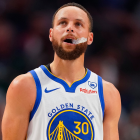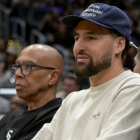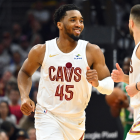
The San Antonio Spurs spent the first few months of Victor Wembanyama's rookie season experimenting with Jeremy Sochan at point guard. It didn't work, and some observers wondered if they might make a move to get a more traditional table-setter. In Year 1 of the Wemby era, they decided not to do that, choosing instead to simply put Tre Jones in the starting lineup in early January.
In Year 2 of the Wemby era, Chris Paul will throw lobs to the French sensation. Hours after being waived by the Golden State Warriors on Sunday, the 39-year-old future Hall of Famer agreed to sign with San Antonio, as first reported by Bleacher Report's Chris Haynes. Paul will join the team on a one-year deal worth upwards of $11 million, according to ESPN's Adrian Wojnarowski.
Paul, per Haynes, wants to elevate Wembanyama's game and show that he can still play at a high level. Entering his 20th season in the NBA, he should not be expected to create the same amount of space as he used to or stay in front of the league's quickest guards defensively. During his one year with the Warriors, though, Paul shot 48% from midrange, per Cleaning The Glass, and made 42.3% of his catch-and-shoot 3s. He's still a weapon, and he will make sure the Spurs are organized.
It's not the exact same situation, but I can't help but wonder if Paul was thinking about the year he spent with the Oklahoma City Thunder when he made this decision. He was five years younger then, and that Thunder team wasn't quite as inexperienced (Steven Adams, Danilo Gallinari and Dennis Schroder all played significant roles), but, for one season, Paul gave everything he had to a team that was definitively not in win-now mode. His leadership helped Oklahoma City exceed expectations and become more than the sum of its parts.
"OKC was unbelievable," Paul said during his appearance on The Pivot Podcast last year. "I might not still be playing if not for that year I had there, 'cause I had that joy back."
Paul fit in just fine in Golden State, but the team was under pressure to recapture its former glory. Paul's previous contract, which included $30 million in non-guaranteed 2024-25 salary, meant that he functioned as both a sixth man and, potentially, a trade exception. In San Antonio, the situation is much simpler: His job is to put people in the right places, pass down his knowledge and, ideally, help the team win more games than the year before. Given that the Spurs went 22-60 in 2023-24, that last part shouldn't be particularly difficult, if only because Wembanyama will be even better (and, presumably, they won't wait 30-plus games to start a proper point guard and start Wembanyama at center).
Before Wembanyama had even played an NBA game, it was popular to suggest that San Antonio should trade for Paul. The appeal of Paul-Wembanyama running pick-and-rolls requires no explanation, and it seemed like the sort of place that Paul might like to be, too. The Spurs were patient, though, and for that they were rewarded with the chance to sign Paul outright, using either cap space or part of their mid-level exception, depending on what they decide to do with Devonte' Graham's non-guaranteed deal. This is one of those signings that makes perfect sense for the free agent, for the franchise player and for the coach. Even if Paul declines drastically or can't stay on the court, his presence will be felt in San Antonio. If you can think of any real downside (aside from the opportunity cost of not using this money on somebody younger, I suppose), I'd love to hear it.


















